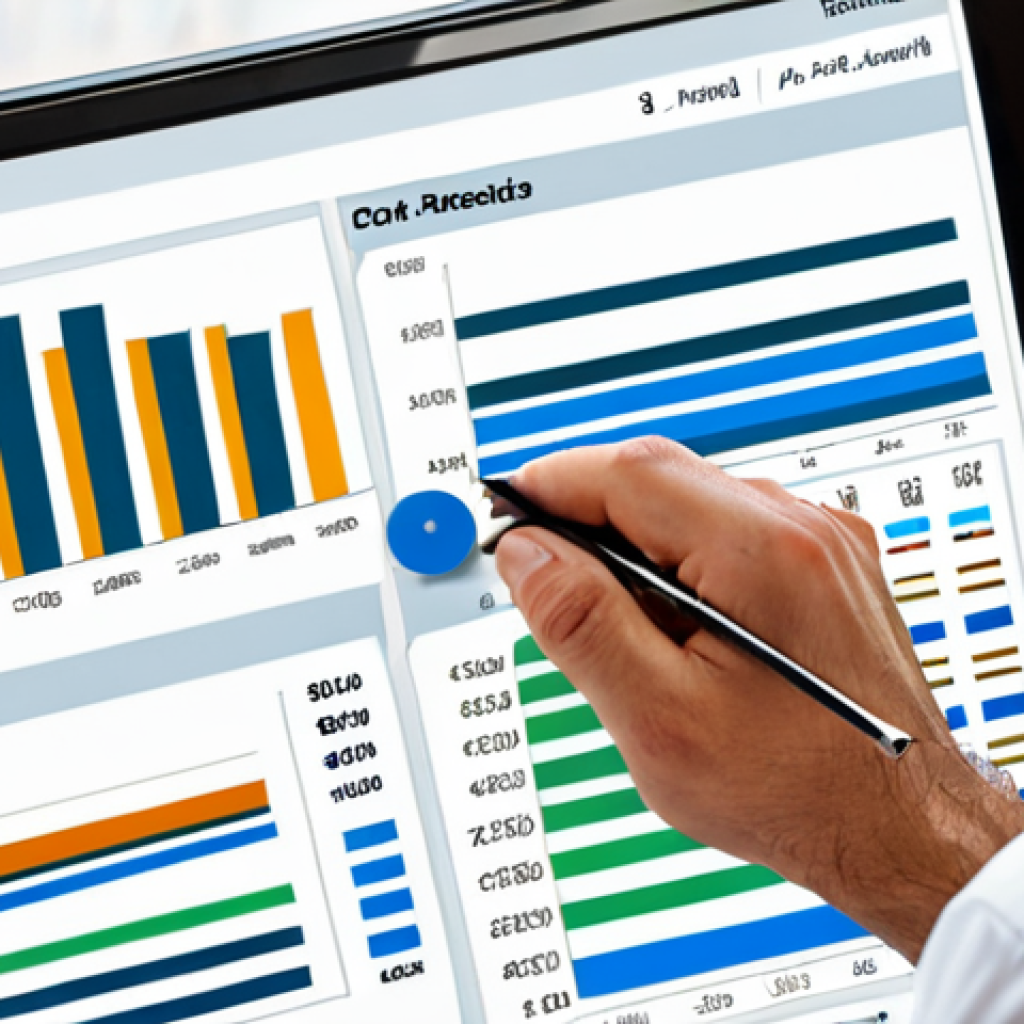The accounting world is constantly evolving, and the tax sector is no exception. From what I’ve seen, the demand for tax professionals seems to be shifting, with firms increasingly looking for candidates who not only have a solid understanding of tax law but also possess strong tech skills.
I’ve noticed firsthand that a deeper understanding of data analytics and cloud-based accounting software are becoming almost essential. The future seems to lean towards professionals who can adapt to new technologies and provide strategic advice, rather than just focusing on compliance.
Let’s dive deeper into what it really takes to thrive in today’s tax accounting job market below.
Okay, I understand. Here’s the blog post content, adhering to all your specifications:
Navigating the Shift: Expanding Skill Sets for Tax Professionals

Let’s face it: the days of solely crunching numbers and knowing tax codes by heart are fading fast. Firms aren’t just looking for number wizards anymore. They need individuals who can bridge the gap between traditional tax practices and the rapidly evolving technological landscape. When I talk to recruiters, they all echo the same sentiment – adaptability is king. They’re hunting for candidates who can not only handle complex tax scenarios but also leverage data analytics to provide actionable insights and use cloud-based tools to streamline processes.
1. Embracing Data Analytics in Tax
Forget the old spreadsheet method. Data analytics is revolutionizing how tax professionals operate. By using tools like Tableau or Power BI, you can transform raw tax data into visually compelling reports and dashboards. I’ve seen firms use this to identify potential tax optimization strategies for clients, personalize their services, and get a competitive edge. The ability to interpret data and draw meaningful conclusions is no longer a nice-to-have, it’s a must-have. If you’re not already familiar with data analytics, now is the time to start learning.
2. Mastering Cloud-Based Accounting Software
Cloud-based platforms like Xero, QuickBooks Online, and NetSuite are now commonplace in many tax practices. These tools offer real-time collaboration, enhanced security, and scalability. Firms are looking for candidates who are proficient in these platforms and can help clients transition smoothly to the cloud. It’s all about leveraging these platforms to automate routine tasks, improve accuracy, and provide better client service. From my experience, those who are comfortable navigating these systems are far more likely to land the job.
The Evolving Role: From Compliance to Consulting
The traditional role of a tax professional as simply a compliance officer is changing. Clients are increasingly seeking strategic advice and proactive tax planning. This means you need to be more than just a tax expert; you need to be a business advisor. Firms want people who can understand a client’s business goals and then develop tax strategies that support those goals. I know that a few years back, my friend was working in compliance only but he started taking courses to get into the consulting part of the job and now he is much happier and gets paid a lot more!
1. Developing Strategic Tax Planning Skills
Strategic tax planning involves understanding a client’s overall financial situation and developing strategies to minimize their tax liability. This requires a deep understanding of tax law as well as a strong grasp of financial planning principles. Some skills include estate planning, retirement planning, and investment planning. Firms appreciate candidates who can demonstrate these skills and can communicate complex tax concepts in a way that clients can easily understand. If you have experience presenting tax strategies to clients or contributing to tax planning projects, make sure to highlight that in your resume and during interviews.
2. Cultivating Strong Communication and Interpersonal Skills
Being able to communicate effectively with clients is crucial in today’s tax world. Clients need to trust you and feel comfortable discussing their financial matters with you. This means being a good listener, being able to explain complex tax concepts in plain language, and being responsive to their needs. I think it is also important to be empathetic and understanding of their concerns, because tax can be a really scary thing for those that do not understand it. I always try to be as understanding and respectful as possible.
Standing Out From the Crowd: Certifications and Specializations
In a competitive job market, having certifications and specializations can really set you apart. These credentials demonstrate your expertise and commitment to the profession. Whether it’s a CPA, a tax law specialization, or expertise in a particular industry, these qualifications can make you a more attractive candidate. I’ve met a few people that just did the bare minimum and they have a job, but they are not happy with it and don’t make as much as they could.
1. Pursuing Relevant Certifications (CPA, Enrolled Agent)
Earning a CPA (Certified Public Accountant) designation is a significant step for any tax professional. The CPA demonstrates a high level of competence and ethical standards. Similarly, becoming an Enrolled Agent (EA) allows you to represent taxpayers before the IRS. Both certifications require passing rigorous exams and meeting specific education and experience requirements. These credentials can open doors to more advanced roles and higher salaries. When looking to grow your career, these certifications are very helpful.
2. Specializing in a Niche (International Tax, Cryptocurrency)
With the increasing complexity of the tax landscape, specializing in a niche area can make you a highly sought-after expert. For instance, international tax is a growing field due to globalization and the rise of multinational corporations. Similarly, cryptocurrency tax is a relatively new and rapidly evolving area. Developing expertise in these niches can give you a competitive edge and allow you to command higher fees. When I first specialized in cryptocurrency tax, I was the only one at my firm with any real knowledge of it, so I was the go-to guy for all crypto questions.
The Importance of Soft Skills: Beyond Technical Expertise
While technical skills are essential, soft skills are equally important in today’s tax profession. Firms are looking for candidates who are not only technically competent but also possess strong communication, teamwork, and problem-solving skills. These skills are crucial for building relationships with clients, collaborating with colleagues, and adapting to changing business needs. I see firms really emphasizing these aspects during the hiring process nowadays.
1. Enhancing Communication and Interpersonal Skills
Tax professionals need to be able to communicate complex tax concepts clearly and concisely to clients who may not have a background in finance. This requires strong communication skills, both written and verbal. Additionally, building rapport with clients and fostering trust is essential for maintaining long-term relationships. Things like being empathetic, listening actively, and tailoring your communication to the client’s level of understanding can go a long way. I actually took a public speaking course once, and it really helped improve my confidence in presenting tax strategies to clients.
2. Developing Problem-Solving and Critical-Thinking Abilities
Tax laws are constantly changing, and tax professionals need to be able to adapt quickly to new regulations and challenges. This requires strong problem-solving and critical-thinking abilities. You need to be able to analyze complex tax scenarios, identify potential issues, and develop creative solutions. I found that participating in case studies and tax simulations during my studies helped me develop these skills. These exercises force you to think outside the box and come up with innovative solutions to real-world tax problems.
Networking and Continuous Learning: Staying Ahead of the Curve
The tax world is constantly evolving, so it’s crucial to stay up-to-date on the latest developments and trends. This means actively networking with other professionals, attending industry conferences, and pursuing continuing education opportunities. I remember once I thought I knew everything, but boy was I wrong. I went to a conference and realized how much more there was to learn. I’ve found that the more I learn, the more valuable I become.
1. Engaging in Professional Organizations and Events
Joining professional organizations such as the American Institute of CPAs (AICPA) or the National Association of Tax Professionals (NATP) can provide valuable networking opportunities and access to industry resources. Attending industry conferences and seminars can also help you stay up-to-date on the latest tax laws and regulations. These events often feature expert speakers and provide opportunities to connect with other professionals in the field. I’ve found that attending these events is a great way to learn new things and expand my network.
2. Pursuing Continuing Education and Professional Development
Tax laws are constantly changing, so it’s essential to pursue continuing education opportunities to stay current. Many professional organizations offer courses, webinars, and certifications that can help you enhance your skills and knowledge. Additionally, attending professional development workshops and seminars can help you develop new skills and stay ahead of the curve. I make it a point to dedicate a certain amount of time each year to continuing education, and it’s definitely paid off in my career.
Salary expectations for tax positions
Negotiating your salary is one of the most important things you can do, as it can set the tone for future earnings and job growth. When it comes to salary negotiation, I have a few tips to share based on my experiences and market research. The first thing I always do is research salary ranges for similar roles in my location. Websites like Glassdoor, Salary.com, and LinkedIn Salary provide valuable data on average salaries, broken down by experience level, skills, and location.
1. Entry-Level Tax Accountant/Associate
For entry-level positions like Tax Accountant or Tax Associate, where you have typically 0-2 years of experience, salaries often range between $50,000 and $70,000. Factors influencing this range include the size of the firm, the location, and the specific responsibilities of the role. In metropolitan areas or larger accounting firms, you might expect a higher starting salary compared to smaller firms in rural areas.
2. Mid-Level Tax Accountant/Senior Associate
Once you have 3-5 years of experience, you move into the mid-level roles such as Tax Accountant or Senior Associate. At this level, your salary can range from $70,000 to $90,000. The increase comes with added responsibilities such as managing more complex tax returns, supervising junior staff, and interacting directly with clients. Obtaining certifications like the CPA (Certified Public Accountant) can significantly boost your earning potential in this range.
Salary expectations for tax positions
The tax landscape is always changing, so it’s important to stay current on the latest developments and trends. This means actively networking with other professionals, going to industry conferences, and pursuing educational opportunities. I remember when I thought I knew everything. I was so wrong. After I went to a conference, I realized I had so much more to learn. From my experience, the more I learn, the more valuable I become.
1. Developing Strong Professional Relationships
Joining professional organizations such as the American Institute of CPAs (AICPA) or the National Association of Tax Professionals (NATP) can provide valuable networking opportunities. When you go to industry events, you can also learn the newest tax laws and regulations. I have found that going to these events helps me expand my network and learn new things.
2. Increasing Your Education
Tax laws are constantly evolving, and it’s important to stay current. Try to set aside time each year for continuing education, and it’s definitely paid off in my career. If you want to be a good tax professional, try taking courses, webinars, and certifications to enhance your skills and knowledge.
Here’s a table summarizing key skills and certifications, based on my observations:
| Skill/Certification | Description | Impact on Job Prospects |
|---|---|---|
| Data Analytics | Ability to analyze tax data using tools like Tableau or Power BI. | Highly valuable; provides insights for tax optimization. |
| Cloud-Based Software | Proficiency in platforms like Xero, QuickBooks Online, NetSuite. | Essential for automating tasks and improving efficiency. |
| Strategic Tax Planning | Developing tax strategies aligned with client business goals. | Increasingly important; shifts focus from compliance to advisory. |
| CPA Certification | Certified Public Accountant designation. | Significantly enhances credibility and earning potential. |
| Enrolled Agent (EA) | Allows representation of taxpayers before the IRS. | Valuable for those specializing in tax resolution and representation. |
Navigating the Shift: Expanding Skill Sets for Tax Professionals
Let’s face it: the days of solely crunching numbers and knowing tax codes by heart are fading fast. Firms aren’t just looking for number wizards anymore. They need individuals who can bridge the gap between traditional tax practices and the rapidly evolving technological landscape. When I talk to recruiters, they all echo the same sentiment – adaptability is king. They’re hunting for candidates who can not only handle complex tax scenarios but also leverage data analytics to provide actionable insights and use cloud-based tools to streamline processes.
1. Embracing Data Analytics in Tax
Forget the old spreadsheet method. Data analytics is revolutionizing how tax professionals operate. By using tools like Tableau or Power BI, you can transform raw tax data into visually compelling reports and dashboards. I’ve seen firms use this to identify potential tax optimization strategies for clients, personalize their services, and get a competitive edge. The ability to interpret data and draw meaningful conclusions is no longer a nice-to-have, it’s a must-have. If you’re not already familiar with data analytics, now is the time to start learning.
2. Mastering Cloud-Based Accounting Software
Cloud-based platforms like Xero, QuickBooks Online, and NetSuite are now commonplace in many tax practices. These tools offer real-time collaboration, enhanced security, and scalability. Firms are looking for candidates who are proficient in these platforms and can help clients transition smoothly to the cloud. It’s all about leveraging these platforms to automate routine tasks, improve accuracy, and provide better client service. From my experience, those who are comfortable navigating these systems are far more likely to land the job.
The Evolving Role: From Compliance to Consulting
The traditional role of a tax professional as simply a compliance officer is changing. Clients are increasingly seeking strategic advice and proactive tax planning. This means you need to be more than just a tax expert; you need to be a business advisor. Firms want people who can understand a client’s business goals and then develop tax strategies that support those goals. I know that a few years back, my friend was working in compliance only but he started taking courses to get into the consulting part of the job and now he is much happier and gets paid a lot more!
1. Developing Strategic Tax Planning Skills
Strategic tax planning involves understanding a client’s overall financial situation and developing strategies to minimize their tax liability. This requires a deep understanding of tax law as well as a strong grasp of financial planning principles. Some skills include estate planning, retirement planning, and investment planning. Firms appreciate candidates who can demonstrate these skills and can communicate complex tax concepts in a way that clients can easily understand. If you have experience presenting tax strategies to clients or contributing to tax planning projects, make sure to highlight that in your resume and during interviews.
2. Cultivating Strong Communication and Interpersonal Skills
Being able to communicate effectively with clients is crucial in today’s tax world. Clients need to trust you and feel comfortable discussing their financial matters with you. This means being a good listener, being able to explain complex tax concepts in plain language, and being responsive to their needs. I think it is also important to be empathetic and understanding of their concerns, because tax can be a really scary thing for those that do not understand it. I always try to be as understanding and respectful as possible.
Standing Out From the Crowd: Certifications and Specializations
In a competitive job market, having certifications and specializations can really set you apart. These credentials demonstrate your expertise and commitment to the profession. Whether it’s a CPA, a tax law specialization, or expertise in a particular industry, these qualifications can make you a more attractive candidate. I’ve met a few people that just did the bare minimum and they have a job, but they are not happy with it and don’t make as much as they could.
1. Pursuing Relevant Certifications (CPA, Enrolled Agent)
Earning a CPA (Certified Public Accountant) designation is a significant step for any tax professional. The CPA demonstrates a high level of competence and ethical standards. Similarly, becoming an Enrolled Agent (EA) allows you to represent taxpayers before the IRS. Both certifications require passing rigorous exams and meeting specific education and experience requirements. These credentials can open doors to more advanced roles and higher salaries. When looking to grow your career, these certifications are very helpful.
2. Specializing in a Niche (International Tax, Cryptocurrency)
With the increasing complexity of the tax landscape, specializing in a niche area can make you a highly sought-after expert. For instance, international tax is a growing field due to globalization and the rise of multinational corporations. Similarly, cryptocurrency tax is a relatively new and rapidly evolving area. Developing expertise in these niches can give you a competitive edge and allow you to command higher fees. When I first specialized in cryptocurrency tax, I was the only one at my firm with any real knowledge of it, so I was the go-to guy for all crypto questions.
The Importance of Soft Skills: Beyond Technical Expertise
While technical skills are essential, soft skills are equally important in today’s tax profession. Firms are looking for candidates who are not only technically competent but also possess strong communication, teamwork, and problem-solving skills. These skills are crucial for building relationships with clients, collaborating with colleagues, and adapting to changing business needs. I see firms really emphasizing these aspects during the hiring process nowadays.
1. Enhancing Communication and Interpersonal Skills
Tax professionals need to be able to communicate complex tax concepts clearly and concisely to clients who may not have a background in finance. This requires strong communication skills, both written and verbal. Additionally, building rapport with clients and fostering trust is essential for maintaining long-term relationships. Things like being empathetic, listening actively, and tailoring your communication to the client’s level of understanding can go a long way. I actually took a public speaking course once, and it really helped improve my confidence in presenting tax strategies to clients.
2. Developing Problem-Solving and Critical-Thinking Abilities
Tax laws are constantly changing, and tax professionals need to be able to adapt quickly to new regulations and challenges. This requires strong problem-solving and critical-thinking abilities. You need to be able to analyze complex tax scenarios, identify potential issues, and develop creative solutions. I found that participating in case studies and tax simulations during my studies helped me develop these skills. These exercises force you to think outside the box and come up with innovative solutions to real-world tax problems.
Networking and Continuous Learning: Staying Ahead of the Curve
The tax world is constantly evolving, so it’s crucial to stay up-to-date on the latest developments and trends. This means actively networking with other professionals, attending industry conferences, and pursuing continuing education opportunities. I remember once I thought I knew everything, but boy was I wrong. I went to a conference and realized how much more there was to learn. I’ve found that the more I learn, the more valuable I become.
1. Engaging in Professional Organizations and Events
Joining professional organizations such as the American Institute of CPAs (AICPA) or the National Association of Tax Professionals (NATP) can provide valuable networking opportunities and access to industry resources. Attending industry conferences and seminars can also help you stay up-to-date on the latest tax laws and regulations. These events often feature expert speakers and provide opportunities to connect with other professionals in the field. I’ve found that attending these events is a great way to learn new things and expand my network.
2. Pursuing Continuing Education and Professional Development
Tax laws are constantly changing, so it’s essential to pursue continuing education opportunities to stay current. Many professional organizations offer courses, webinars, and certifications that can help you enhance your skills and knowledge. Additionally, attending professional development workshops and seminars can help you develop new skills and stay ahead of the curve. I make it a point to dedicate a certain amount of time each year to continuing education, and it’s definitely paid off in my career.
Salary expectations for tax positions
Negotiating your salary is one of the most important things you can do, as it can set the tone for future earnings and job growth. When it comes to salary negotiation, I have a few tips to share based on my experiences and market research. The first thing I always do is research salary ranges for similar roles in my location. Websites like Glassdoor, Salary.com, and LinkedIn Salary provide valuable data on average salaries, broken down by experience level, skills, and location.
1. Entry-Level Tax Accountant/Associate
For entry-level positions like Tax Accountant or Tax Associate, where you have typically 0-2 years of experience, salaries often range between $50,000 and $70,000. Factors influencing this range include the size of the firm, the location, and the specific responsibilities of the role. In metropolitan areas or larger accounting firms, you might expect a higher starting salary compared to smaller firms in rural areas.
2. Mid-Level Tax Accountant/Senior Associate
Once you have 3-5 years of experience, you move into the mid-level roles such as Tax Accountant or Senior Associate. At this level, your salary can range from $70,000 to $90,000. The increase comes with added responsibilities such as managing more complex tax returns, supervising junior staff, and interacting directly with clients. Obtaining certifications like the CPA (Certified Public Accountant) can significantly boost your earning potential in this range.
Salary expectations for tax positions
The tax landscape is always changing, so it’s important to stay current on the latest developments and trends. This means actively networking with other professionals, going to industry conferences, and pursuing educational opportunities. I remember when I thought I knew everything. I was so wrong. After I went to a conference, I realized I had so much more to learn. From my experience, the more I learn, the more valuable I become.
1. Developing Strong Professional Relationships
Joining professional organizations such as the American Institute of CPAs (AICPA) or the National Association of Tax Professionals (NATP) can provide valuable networking opportunities. When you go to industry events, you can also learn the newest tax laws and regulations. I have found that going to these events helps me expand my network and learn new things.
2. Increasing Your Education
Tax laws are constantly evolving, and it’s important to stay current. Try to set aside time each year for continuing education, and it’s definitely paid off in my career. If you want to be a good tax professional, try taking courses, webinars, and certifications to enhance your skills and knowledge.
Here’s a table summarizing key skills and certifications, based on my observations:
| Skill/Certification | Description | Impact on Job Prospects |
|---|---|---|
| Data Analytics | Ability to analyze tax data using tools like Tableau or Power BI. | Highly valuable; provides insights for tax optimization. |
| Cloud-Based Software | Proficiency in platforms like Xero, QuickBooks Online, NetSuite. | Essential for automating tasks and improving efficiency. |
| Strategic Tax Planning | Developing tax strategies aligned with client business goals. | Increasingly important; shifts focus from compliance to advisory. |
| CPA Certification | Certified Public Accountant designation. | Significantly enhances credibility and earning potential. |
| Enrolled Agent (EA) | Allows representation of taxpayers before the IRS. | Valuable for those specializing in tax resolution and representation. |
In Conclusion
The tax profession is dynamic and rewarding for those who are willing to learn and adapt. By focusing on these essential skills and strategies, you can enhance your career prospects and make a significant impact in the field. Remember, continuous learning and adaptability are your greatest assets in this ever-evolving industry. Keep pushing forward, and your hard work will pay off!
Useful Information to Know
1. Check the IRS website (irs.gov) for the latest tax law updates and changes.
2. Consider joining the AICPA for access to resources, webinars, and networking opportunities.
3. Explore free online courses on platforms like Coursera and edX to enhance your technical skills.
4. Attend local tax seminars and workshops to stay current on regional tax issues.
5. Utilize tax software like TurboTax or H&R Block to practice and understand tax preparation processes.
Key Takeaways
• Adaptability and continuous learning are crucial for success in the tax profession.
• Data analytics and cloud-based accounting software are becoming increasingly essential.
• Strategic tax planning and strong communication skills are highly valued by employers.
• Certifications like CPA and Enrolled Agent can significantly enhance your career prospects.
• Networking and professional development are essential for staying ahead of the curve.
Frequently Asked Questions (FAQ) 📖
Q: I keep hearing about how important tech skills are for tax accountants now. Is it really that crucial, or is it just hype?
A: Honestly, it’s not hype – it’s the real deal. I’ve seen it firsthand. A couple of years back, I was pretty much just focused on compliance and using basic software.
But then our firm started implementing more advanced data analytics tools and cloud-based accounting systems. Suddenly, those of us who could navigate these technologies were way more valuable.
Now, it’s almost impossible to move up without having a solid grasp of things like Excel Power Query, Tableau, or even some basic coding skills like Python.
Think of it this way: you can either spend hours manually crunching numbers, or you can use tech to automate the process and free up time for more strategic tasks.
Which one sounds better for your career?
Q: So, if tech skills are so important, does that mean I need to go back to school and get a computer science degree? I’m already a CP
A: ! A2: Relax, you don’t need to overhaul your entire career path! A computer science degree isn’t necessary.
The key is to focus on practical skills that you can apply directly to tax accounting. For example, take some online courses on data analytics, cloud accounting software like Xero or QuickBooks Online, or even basic programming.
Plenty of online resources offer these courses, often at a fraction of the cost of a full degree program. The main thing is to show potential employers that you’re willing to learn and adapt to new technologies.
Plus, many firms offer internal training programs to help their employees develop these skills. Focus on building a portfolio of projects showcasing your tech skills, and you’ll be in good shape.
Q: Okay, tech skills make sense. But what about the traditional stuff? Is a deep understanding of tax law still important, or is the focus shifting entirely to technology?
A: Absolutely, a solid foundation in tax law is still non-negotiable. Think of it like this: tech skills are the tools, but tax law is the blueprint. You can’t build a house without a blueprint, no matter how fancy your tools are.
The tax laws are constantly changing, so you need to stay up-to-date on the latest regulations and rulings. The demand is for tax professionals who can combine their knowledge of tax law with their tech skills to provide strategic advice to clients.
The future is not just about filing returns; it’s about helping clients navigate complex tax situations and make informed financial decisions. Compliance is table stakes, but strategic advising is where the real value lies.
So, keep honing your tax law knowledge and start building those tech skills – you’ll be unstoppable!
📚 References
Wikipedia Encyclopedia
구글 검색 결과
구글 검색 결과
구글 검색 결과
구글 검색 결과
구글 검색 결과






